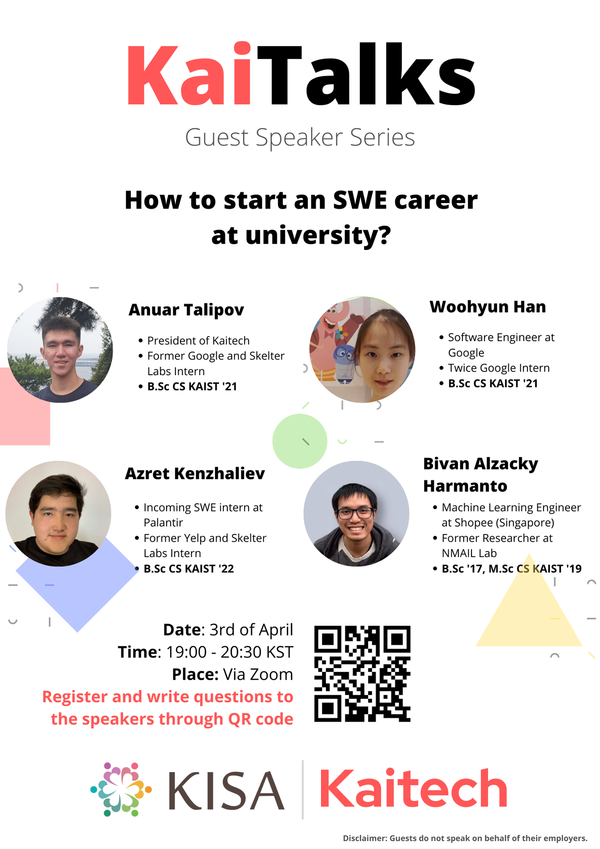On April 3, KAITech, a student-run organization focused on exploring and promoting career opportunities for KAIST students, aired the first episode of KaiTalks series in collaboration with KAIST International Students Organization (KISA). The series intends to support KAITech’s goal of creating an extensive professional network of KAIST students and alumni by organizing educational talks, where invited speakers can share their unique experiences in various technical fields.

The first episode, titled “How to start an SWE career at university?”, revolved around the discussion of the hiring process for internships and new graduate roles in the field of software engineering, and the ways of preparing oneself for the job market while in school. Four students and alumni from the School of Computing joined the talk as guest speakers: KAITech President Anuar Talipov, Woohyun Han, Bivan Alzacky Harmanto, and Azret Kenzhaliev. All of the speakers have substantial experience interning in the industry and at various research institutions. Both Talipov and Han did their internships at Google, with Han currently holding a full-time job as a software engineer there. Bivan Alzacky Harmanto, who finished both of his BS and MS degrees at KAIST, has extensive research experience in the field of machine learning and is currently employed as a machine learning engineer by Shopee Singapore. Lastly, Azret Kenzhaliev had an opportunity to intern at the German office of Yelp and is to join Palantir as an SWE intern this summer.
Throughout the talk, the speakers stressed the importance of networking and utilizing the referral system to one’s advantage. Quoting Talipov, “If you are fortunate enough to, for example, have an acquaintance or alumni who works [in the company you want to apply to], you can ask them to show your resume to the HR. Because in the big companies, … they have a lot of applicants, and I think they spend around 30 seconds on your resume.” However, with a referral from inside the company, there is a bigger chance for an applicant to receive an interview invitation. They also advised to keep one’s eyes open for the various opportunities and events available to students, such as hackathons, workshops, and conferences, since they not only allow one to grow as a professional, but also to expand one’s network. Further into the talk, the speakers discussed their resume and interview preparation tips; Kenzhaliev shared his resume in real time and gave a detailed explanation of its essential parts.
KAITech hopes for the series to become a long-term initiative, helping students to navigate their professional lives. Regarding the future of KaiTalks, Talipov said, “I hope that once we gain momentum we could invite notable people from outside of KAIST. It will certainly be interesting, because, in my opinion, the circulation of ideas should not be constrained within one university. Such an initiative would bring a diversity of experiences to our campus. I hope that KaiTalks will continue being conducted and when this pandemic ends, we will consider doing [them] offline.” He also mentioned that the organization is currently in the brainstorming stage for the next talk, and would welcome any feedback on the first episode here. You can also watch the full version by visiting the following link.

